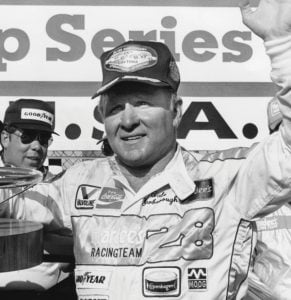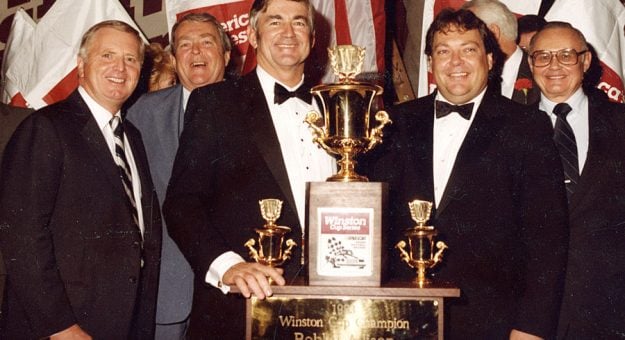Editor’s Note: NASCAR is celebrating its 75th anniversary in 2023. SPEED SPORT was founded in 1934 and was already on its way to becoming America’s Motorsports Authority when NASCAR was formed. As a result, we will bring you Part 36 of a 75-part series on the history of NASCAR as told in the pages of National Speed Sport News and SPEED SPORT Magazine.
As the river rises, so do all the boats. As the advertising dollars dramatically increased in NASCAR Winston Cup competition in the early 1980s — thanks in large part to television exposure — the level of competition rose.
The days of Richard Petty winning 10 consecutive races or David Pearson earning 11 victories in only 18 starts with better-funded teams than the majority of their competition were over.
While a core group of the most talented, experienced and richest teams continued to run at the front of the pack in 1983, now they were not alone. The 25th Daytona 500 was seen by 25 million CBS television viewers, who watched from the cockpit camera in Cale Yarborough’s backup Pontiac Le Mans as he drafted Buddy Baker going into the final lap.
As expected, Yarborough used the slingshot out of tum two to pass Baker for his third Daytona 500 victory.
Another familiar face was in victory lane the following week as Bobby Allison won Richmond (Va.) Raceway. Vital to the victory was DiGard Racing crew chief Gary Nelson calling for a splash and go with 15 laps remaining despite old tires on Allison’s Monte Carlo SS. The most recognizable face ever in Winston Cup victory lane, Richard Petty, finished eighth in his 900th career Winston Cup start.
Petty’s 901st career start ended with his 196th victory. The old pro held off Bill Elliott, whose fourth-turn, white-flag lap dive fell short by less than a car length. Yarborough won for the seventh time at Atlanta Motor Speedway, but Neil Bonnett pushed the 43-year-old to the limit and finished second.
Before season ended, Yarborough won twice at Michigan Int’l Speedway and claimed four victories in only 16 races.
Harry Gant was the first to break the seeming stranglehold the big four of Yarborough, Petty, Allison and Darrell Waltrip had on Winston Cup victories so far this season On April 10, the two-time victor and 11-time runner-up in the past two seasons won at Darlington (S.C.) Raceway. However, Gant’s victory required some luck.
Waltrip led Gant by over 10 lengths with only three laps remaining when the No. 11 Monte Carlo fell off the pace with ignition trouble.
“I couldn’t believe it,” Gant said in the April 13 National Speed Sport News. “I’ve never been in second place in a Grand National race and had the leader fall out. After all the times I’ve finished second, I didn’t think those kinds of things happened.”

Waltrip subsequently went on a tear, scoring four victories in six races before another victory lane irregular, Neil Bonnett, won the World 600 at Charlotte (N.C.) Motor Speedway for the second consecutive time.
A late-race accident put Bonnett and Petty at the front for the restart, which Petty used to lead two laps before Bonnett passed him for the final lead change with 52 laps remaining in the 400-lap event.
“The crew kept telling me what I was running and what Richard was running,” said Bonnett after his 12th career victory. “I’d look in the mirror and could see that little red-and-blue race car coming. I knew the man behind the wheel meant business.”
Ricky Rudd passed Gant late in the running to earn his first Winston Cup victory at Riverside (Calif.) Int’l Raceway.
Rudd’s first victory in his 161 starts was also the first for car owner Richard Childress. The second came at Martinsville (Va.) Speedway in September. While not unaccustomed to winning, Buddy Baker broke a two-season winless streak in his first season with the Wood Brothers.
On the final lap of the last caution period during the Firecracker 400 at Daytona, the Wood Brothers decided to bring Baker out of the lead pack to top off the fuel tank. Baker followed the orders, but was screaming over the radio as he entered pit row on lap 87.
“You’re giving the race away! You’re giving the race away!”
Baker was informed that it was not his job to “tell us what to do, just come on in. We’re going to fill the tank.”
As it turned out, Baker followed race leader Terry Labonte under the white flag, but appeared too far behind to slingshot around him. However, when Labonte’s Monte Carlo sputtered with an empty gas tank, Baker powered into the lead thanks to the gas added during the extra pit stop.
Tim Richmond became the 10th different winner in 18 races, winning at Pocono Raceway. Richmond’s first oval and third career Winston Cup victory came after 11 drivers swapped the lead 41 times. The highly competitive race prompted runner-up Waltrip to say, “My mother always told me if you couldn’t win, at least be second.”
Labonte also won a race in 1983, outdueling Richmond at North Carolina Motor Speedway. The victory was the second of his six-year career.
Elliott became the 12th different race winner in 1983 with his first victory in the final race of the season at Riverside.
Allison & Waltrip Dominate Again
Despite the abundance of winners this season, the same two drivers who had dominated the NASCAR Winston Cup circuit for the last two years did so again. Allison took the point lead after his third victory of the season at Dover Downs Int’l Speedway and never looked back, despite pressure from Waltrip.
“They told me Bobby was out of the race after (the Champion Spark Plug 400),” said Waltrip after his second-place finish pulled him to within 61 points of Allison. “That was a thrill.”
Waltrip’s comment seemed cold, yet he held Allison responsible for his runner-up spot at Talladega Superspeedway three weeks earlier. Waltrip led Dale Earnhardt with one lap remaining, but when Earnhardt used the slingshot maneuver to pull into the lead, Allison followed Earnhardt, although he was one lap down.
Allison’s move gave Earnhardt’s car aerodynamic push and put Allison into position to block Waltrip as Earnhardt sped to victory.
“Bobby won the race for Dale,” said an angry Waltrip. “I never thought he would get up there in the way and block like he did.”
“The bottom line is we found ourselves with money and points at stake,” Allison explained in the Aug. 10 NSSN. “It was a situation where we could be villains no matter what happened. I found myself taking the opportunity to follow the fastest car in the draft.”
The point gap narrowed to 41 points after Waltrip tied Petty’s record of six straight victories at Bristol Motor Speedway in August.
Yet, Waltrip would get no closer to a third consecutive championship as Allison reefed off consecutive victories at Darlington, Richmond and Dover to build a 106-point lead which, unlike the past two seasons, held up under Waltrip’s late-season run of one victory and four top fives in the final six races.
“When we started out (in 1961) all we had was a mortgaged pickup truck and a box of tools,” said Allison after clinching the title with a ninth-place finish in the season finale. “We always had faith in ourselves.”
The five-time Winston Cup runner-up was officially declared the champion in a December banquet at the Waldorf-Astoria in New York City.
NASCAR’s other division champions included Winston West driver Jim Robinson, modified ace Freddy Brightbill and Budweiser late model sportsman pilot Sam Ard.
In the Budweiser modified division, Richie Evans reigned while the NASCAR North Stroh’s Tour title went to Robbie Crouch. Michael Waltrip won the Darlington Dash Series and Mike Alexander won the second Winston Racing Series national championship.
